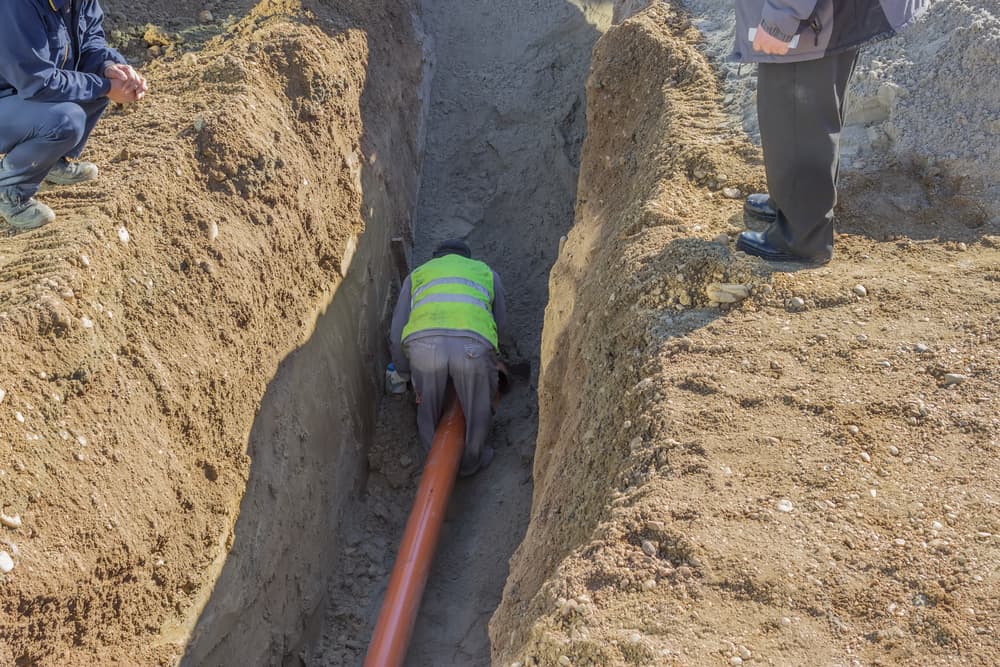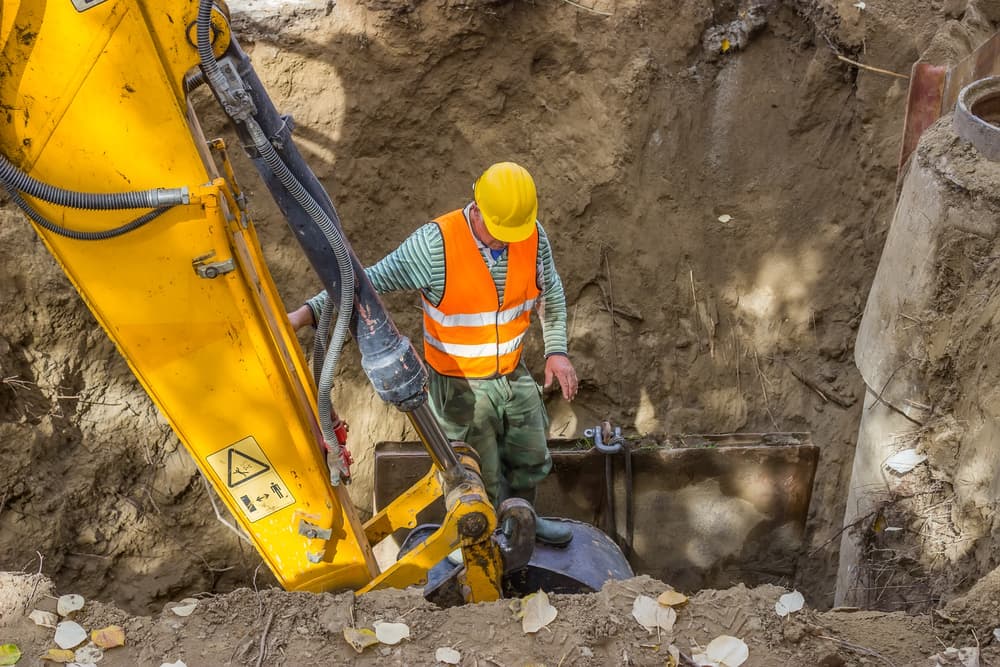Trench collapses on construction sites can occur for various reasons, including inadequate training, negligent contracting work, and lack of supervision. When a trench collapse injures site workers, they may suffer debilitating injuries that prevent them from working and earning money.
If you suffered injuries in a trench collapse accident on a construction site, immediately retain skilled legal counsel. A knowledgeable construction accident lawyer in your area can investigate what happened, determine your options, and file a claim for workers’ compensation benefits (and possibly third-party damages) on your behalf.
How Do Trench Collapses on Construction Sites Occur?
Trench collapses on construction sites are an all-too-frequent consequence of negligence, often resulting from a combination of factors, ranging from inadequate safety measures to insufficient training.
Negligence in some trench collapses involves failing to properly assess and address soil conditions. Construction projects often involve excavating trenches, which are susceptible to collapse if the soil lacks stability.
Negligent contractors may overlook conducting soil tests or fail to adequately shore up trench walls, leading to a heightened risk of collapse.
Furthermore, inadequate training and worker supervision may contribute significantly to trench collapse incidents. Construction workers responsible for digging trenches must be well-versed in safety procedures and have the knowledge necessary to recognize warning signs of potential collapse.
Negligence occurs when employers fail to provide sufficient training or neglect to assign capable supervisors to oversee trenching operations.
In addition to human error, trench collapses may occur due to a lack of proper safety equipment and protective measures.
Protective systems such as trench boxes, shoring, and sloping are essential for stabilizing trench walls and preventing collapse. However, negligence may occur in situations where contractors cut corners by forgoing these safety measures or using outdated equipment that fails to meet required safety standards.
Moreover, time pressures and tight deadlines common in the construction industry can increase the likelihood of negligence, leading to trench collapses. In a rush to meet project deadlines, contractors may prioritize speed over safety, leading to shortcuts and oversights.
Legal and ethical responsibilities also come into play when determining negligence in trench collapses. Employers have a duty of care to provide a safe working environment for their employees, which includes following industry regulations and using best practices for trenching operations. Failing to fulfill these obligations amounts to negligence and can result in severe accidents and injuries for site workers.
Common Injuries in a Trench Collapse Incident
Trench collapses on construction sites pose grave risks to workers.
One of the most common injuries in trench collapses is blunt force trauma, which occurs when workers are struck by falling debris or equipment as the trench walls collapse.
The sheer force of collapsing soil and materials can cause severe injuries, including fractures, concussions, and internal injuries, posing an immediate danger to workers who are caught in the collapse.
Additionally, entrapment is a serious concern in trench collapses, as workers may become buried beneath tons of soil and debris, resulting in suffocation or crush injuries.

The weight and pressure of the soil can restrict breathing and circulation, leading to asphyxiation and traumatic injuries to the chest and abdomen. Rapid response and excavation efforts are crucial in these cases to prevent further harm and maximize the worker’s chances of survival.
Furthermore, excavation equipment and machinery injuries are common in trench collapses. Workers operating heavy machinery, such as excavators or backhoes, may suffer injuries if the equipment becomes unstable or malfunctions during trenching operations. Accidents involving machinery can also result in crush injuries, traumatic amputations, and severe lacerations.
Respiratory injuries are also a significant concern in trench collapses – particularly in cases where workers are exposed to hazardous gasses or lack proper respiratory protection.
The sudden release of gasses trapped within the soil, such as carbon dioxide or methane, can pose serious health risks, including respiratory distress, chemical burns, and even death. Proper ventilation and the use of respiratory protective equipment are essential in lessening these risks and safeguarding workers’ health.
Lastly, psychological trauma can affect workers involved in trench collapses, both directly and indirectly. Witnessing or experiencing a trench collapse can have long-lasting effects on a worker’s mental well-being, leading to post-traumatic stress disorder (PTSD), anxiety, and depression.
If you suffered any of these injuries in a trench collapse on a construction site, an experienced construction accident attorney can handle the legal steps of your case while you attend medical appointments and focus on your recovery.
Filing a Workers’ Compensation Claim after a Trench Collapse Incident
A workers’ compensation claim after a trench collapse can recover financial assistance and medical support.

- The first step in filing a workers’ compensation claim is to report the injury to an employer or supervisor as soon as possible following the trench collapse. Prompt reporting is essential to ensure that the incident is documented accurately and that the injured worker receives timely medical attention. Failing to report the injury promptly may jeopardize the worker’s ability to file a successful claim.
- After reporting the injury, the next step is to seek ongoing medical treatment for injuries sustained in the trench collapse. It’s crucial for injured workers to document their injuries and follow the prescribed treatment plan from their healthcare provider. Medical records and documentation of treatment will serve as evidence to support the workers’ compensation claim.
- The injured worker should also notify their employer of their intent to file a workers’ compensation claim. Employers are typically required by law to provide workers’ compensation benefits to employees who suffer work-related injuries, including those resulting from trench collapses. However, employers may dispute the claim or attempt to minimize the extent of the worker’s injuries. Therefore, it’s important for workers to retain experienced legal counsel as quickly as possible after their accident.
- After filing the claim, the workers’ compensation insurer will investigate the incident and determine the claim’s validity. This may involve reviewing medical records, gathering witness statements, and interviewing the injured worker and other relevant parties. The insurer will then decide whether the worker qualifies for benefits, which may include compensation for medical expenses, lost wages, and disability benefits.
- In cases where the workers’ compensation claim is denied or disputed, injured workers have the right to appeal the decision through the workers’ compensation system – or pursue legal action through the court system. An experienced workers’ compensation attorney can help injured workers navigate the appeals process and effectively advocate for their rights.
Proving a Third-party Claim Arising From a Trench Collapse on a Construction Site
Proving a third-party claim arising from a construction-site trench collapse involves demonstrating that a party other than the employer or co-workers contributed to the incident through negligent or wrongful actions.
This legal avenue provides injured workers with an additional means of seeking compensation beyond workers’ compensation benefits, potentially holding responsible parties accountable for their actions.
To prove a third-party claim, it’s essential to establish that the negligent actions of another party directly contributed to the trench collapse and resulting injuries. This may involve gathering evidence such as witness statements, expert testimony, and documentation of safety violations or improper procedures.
Demonstrating a clear link between the third party’s actions and the trench collapse is crucial for building a strong liability case.
Common examples of third parties who may be held liable for a trench collapse include subcontractors, property owners, equipment manufacturers, and engineers or architects involved in the project. For instance, subcontractors may be held accountable if they fail to follow safety regulations or improperly install support systems, leading to the collapse. Similarly, property owners may bear responsibility if they neglect to address hazardous conditions or fail to provide adequate supervision on the construction site.
In cases involving defective equipment or materials, such as faulty trench shoring equipment or substandard building materials, you can hold product manufacturers liable for injuries resulting from a trench collapse.
Establishing liability in these cases often requires expert analysis and technical evidence to demonstrate how the defective product contributed to the incident.
Furthermore, you can hold engineers or architects responsible for designing the construction project accountable if their flawed designs or failure to account for soil stability and other safety considerations led to your injuries.
Injured workers may pursue compensation for their injuries through a third-party claim by demonstrating an inherently unsafe design or that the engineer or architect failed to exercise reasonable care in their professional duties.
An experienced construction accident lawyer in your area can identify all potentially responsible parties in your accident scenario, gather appropriate evidence on your behalf, and establish the legal elements necessary to prove your third-party claim or lawsuit for damages.
Third-party Damages in a Trench Collapse Case
In a construction-site trench collapse case, various types of third-party damages may be recoverable, providing injured workers with compensation for the physical, financial, and emotional hardships they endured (and which they may continue to endure) as a direct result of the incident.

An experienced construction accident lawyer can pursue these damages through a favorable settlement offer from the at-fault party’s insurance company or a favorable litigation result in court.
Medical expenses are one of the primary types of damages recoverable in a trench collapse case. This includes reimbursement for past and future medical bills related to the treatment of injuries sustained in the collapse, such as hospitalization, surgeries, rehabilitation, prescription medications, and ongoing medical care. Compensation for medical expenses aims to lessen the financial burden of healthcare costs and ensure that injured workers receive the necessary treatment to recover fully from their injuries.
Lost wages and income are another significant category of damages in trench collapse cases. Injured workers may be entitled to compensation for wages lost due to time off work for medical treatment, recovery, and rehabilitation. Additionally, if the injuries result in long-term disability or diminished earning capacity, workers may seek compensation for future lost wages and diminished earning potential, considering their age, occupation, and skill level.
Pain and suffering damages encompass the physical and emotional pain, discomfort, and distress that injured workers experience as a result of the trench collapse. This may include chronic pain, disability, disfigurement, anxiety, depression, and loss of enjoyment of life.
While more challenging to quantify than economic damages, pain and suffering damages aim to compensate injured construction workers for the intangible harms they endure due to a third party’s negligence.
In cases involving catastrophic injuries or wrongful death resulting from a trench collapse, compensation for non-economic damages, such as loss of consortium, loss of companionship, and emotional distress, may also be recoverable. These damages seek to address the emotional and relational effects that injured workers and their families experience.
Additionally, punitive damages may address third parties’ particularly egregious or reckless negligent actions. Punitive damages punish grossly negligent third parties and to discourage others from committing similar wrongful acts.
An experienced construction accident attorney can first determine your eligibility to file a third-party claim or lawsuit following your trench collapse incident. If you can move forward, your lawyer can estimate your case’s likely settlement or verdict value based on the circumstances.
Your attorney can then aggressively advocate for you during settlement negotiations with the insurance company – or at a court proceeding (such as a jury trial) – to obtain the compensation you deserve for your losses.
Speak With a Knowledgeable Construction Accident Lawyer in Your Area Right Away
If you suffered injuries in a recent trench collapse that occurred on a construction site, it’s important that you act right away. An experienced personal injury lawyer can file the appropriate claim(s) on your behalf, negotiate with insurance company representatives, and work to maximize your overall compensation award.
